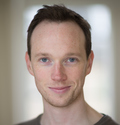Contextuality as a resource for quantum computing
13:00
Tuesday
14
Mar
2017
- Seminar
Organized by:
Speaker:
Teams:

Meeting room 404 (badged access) at IMAG Buiding
Biography of Shane Mansfield
Shane Mansfield is currently based at Paris Diderot University, where he holds a postdoctoral fellowship from the Fondation Sciences Mathématiques de Paris. He is a Junior Research Fellow of Wolfson College, Oxford, and before taking up his current position he worked at the Department of Computer Science at Oxford University as a postdoctoral researcher on the Networked Quantum Information Technology hub of the UK's National Quantum Technologies programme. Prior to that, he held an Oxford Martin Fellowship, working jointly with the Quantum Group at the Department of Computer Science and the QuNaT Group at the Department of Materials on the Oxford Martin Programme for Bio-inspired Quantum Technologies. He completed his DPhil in Computer Science at the University of Oxford in 2013 with Samson Abramsky and Bob Coecke, with a thesis entitled, The Mathematical Structure of Non-locality and Contextuality. He also holds an MASt in Applied Mathematics and Theoretical Physics (Part III Mathematics) from the University of Cambridge; an MSc in Physics (numerical relativity), supervised by Niall Ó Murchadha; and a BSc (joint honours) in Physics & Mathematics; both from University College Cork. He was awarded a National University of Ireland Travelling Studentship in 2010. His research interests lie especially in the application of structural and logical methods from mathematics and theoretical computer science to physics.
I will introduce the notion of contextuality in empirical models, i.e. tables of probabilities of measurement outcomes in an experimental scenario. Contextuality will be seen to include nonlocality as a special case. I will also introduce the ‘contextual fraction’ as a quantitative measure of contextuality. This can be related to quantifiable advantages in informatic tasks, such as games and a form of measurement based quantum computing. It also provides a general way to compare the degree of contextuality across measurement scenarios; it bears a precise relationship to violations of generalised Bell inequalities; its value, and a witnessing inequality, can be computed using linear programming; it is monotone with respect to the “free” operations of a resource theory for contextuality.




